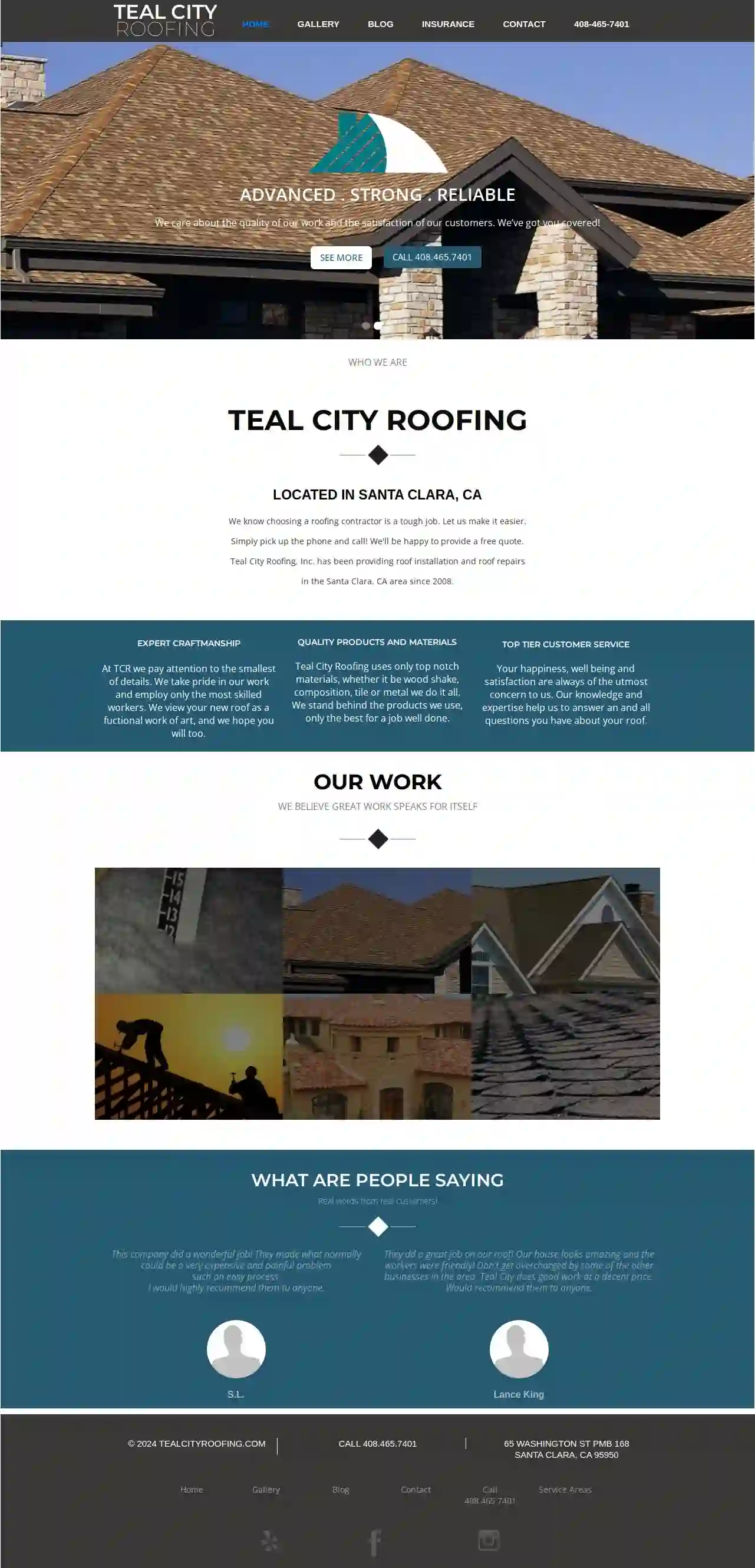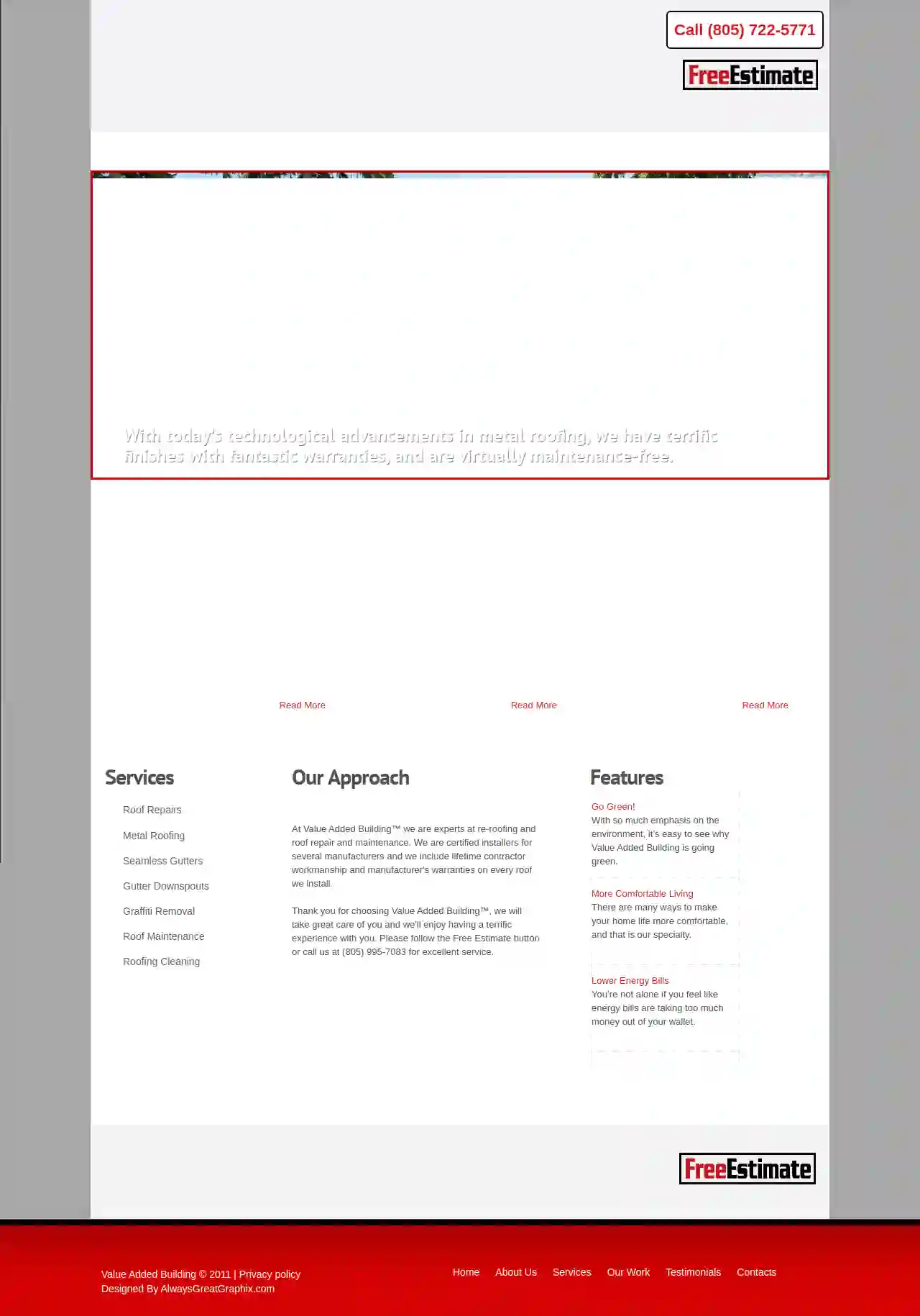Roofing Companies La Habra Heights
Find the best Roofing Company in La Habra Heights
Receive up to 3 Roofers quotes for your project today! Compare profiles, reviews, accreditations, portfolio, etc... and choose the best deal.

Central Roofing Company
51 reviews555 W 182nd St, Los Angeles, USAs a seasoned Ontario roofing contractor, we at Central Roofing provide you, our valued industrial and commercial clients, with the tailored roofing solutions essential for safeguarding your expansive structures and warehouses. As California’s foremost expert in commercial and industrial roofing projects, we, the team at Central Roofing, take immense pride in ensuring that our skilled roofing professionals handle the installation of our large commercial systems with utmost diligence. Safety is paramount to us as a commercial roofing contractor. For every job we undertake, we meticulously craft unique site safety plans and procedures, tailored to the specific needs of each project. We go the extra mile by thoroughly discussing these plans with our customers to guarantee peace of mind and a personal touch in our services. Licensed, Bonded, and Insured, We provide a wide range of Ontario commercial roofing services including roof repairs, cool roof coatings, reroofing, and more. Call Us Today!
- Services
- Why Us?
- Gallery
Get Quote
Teal City Roofing
54 reviewsSanta Clara, CA, 65 Washington ST PMB 168, 95050, USWe care about the quality of our work and the satisfaction of our customers. We’ve got you covered! At TCR we pay attention to the smallest of details. We take pride in our work and employ only the most skilled workers. We view your new roof as a functional work of art, and we hope you will too. We use only top-notch materials, whether it be wood shake, composition, tile or metal we do it all. We stand behind the products we use, only the best for a job well done. Your happiness, well-being, and satisfaction are always of the utmost concern to us. Our knowledge and expertise help us to answer any and all questions you have about your roof.
- Services
- Why Us?
- Accreditations
- Our Team
- Testimonials
- Gallery
Get Quote
gonzalez roofing
53 reviewsSacramento, Sacramento, CA, USGonzalez Roofing is a committed company that serves the whole of Sacramento county and counts on 28 years of expertise in many roofing services. We are a dedicated roofing company that serves the whole of Sacramento County and counts on 28 years of expertise in the field. We are honest and dedicate our work to exceeding our customers' expectations; whether we install a new roof or make an emergency repair, Gonzalez Roofing never lets you down! We know how important it is to keep your roof in good shape; that's why we've gathered a team of experts who can install, repair, or replace old, damaged, outdated, or dangerous roofs and leaks with all kinds of durable materials that fit your needs.
- Services
- Why Us?
- Accreditations
- Gallery
Get Quote
Roof Maxx of Vallejo, CA
57 reviewsVallejo, USRoof Maxx is a safe, easy, proven and affordable alternative to a complicated, expensive and life-disrupting asphalt roof replacement. We offer a FREE roof tune-up with the purchase of a Roof Maxx Treatment. Our family has been in the Vallejo area since the 1930's and we currently live in a home that was built by family in the 1940's. We are so happy to have been able to raise our children in this community. We have been involved in youth soccer, baseball and softball over the years and are happy to now have adult children now to partner with and start a new business together! With over 35 years in the construction industry, we wanted to be able to do something that would help people save money and support their investments. Most people don't think about their roof until it's too late. We hope to change this and reduce the waste levels being added to landfills in the process. With the high cost of homes in the California, every homeowner needs to protect their largest investment This process can help maintain your roof as well as extend its life so you won't need to replace the roof as quickly as you think. This product is eco-friendly and will help reduce the carbon footprint by reducing the need to produce more asphalt for shingles. Our landfills are already extremely full and by extending the life of your roof you can help prevent additional products being added to the landfills. We serve the Vallejo, Benicia, Martinez, Concord, Pleasant Hill, Piedmont, Napa, Suisun City and Fairfield areas. Contact Fred and Tina at (707) 914-1959, [email protected] or [email protected]. "Always treat others the way you would want them to treat you."
- Services
- Why Us?
- Our Team
- Gallery
Get Quote
GAGA US Construction
58 reviewsSuite 600, 450 North Brand Blvd., Glendale, 91203, USWhen Quality is Priority, Renovation and Construction Services in Los Angeles. You Dream, We Build. Established in 2021 (Licenses: #1074874 – B, C13), our company is owned by Arsen Akopyan (over 25 years of construction experience) and his family. We specialize in providing a wide range of services including frame construction, general home remodeling, general home and commercial renovations, ADU, exterior landscaping (decking, artificial grass, paving, demolition, patios, concrete, hardscaping, grading and excavation), fence and gate installation to meet your construction needs (whether it’s a home, backyard or front yard, we will make your dreams come true). Our team consists of skilled professionals who bring a wealth of experience and knowledge to every project. With our attention to detail and commitment to the best, we ensure that your area receives the utmost care and proper attention. You can rely on our team to deliver exceptional results, leaving no corner of your property dirty.
- Services
- Why Us?
- Accreditations
- Our Team
- Gallery
Get Quote
Value Added Building
52 reviewsNA, 805-722-5771, Ventura, 93001, USValue Added Building is a company specializing in re-roofing, roof repair, and maintenance. They are certified installers for several manufacturers and offer lifetime workmanship and manufacturer warranties on all installations. The company emphasizes expertise in clay tile and metal roofs, providing competitive pricing and hands-on management at job sites. They also offer services like seamless gutters, gutter downspouts, graffiti removal, roof repairs, roof maintenance, and roof cleaning. Their commitment to quality and customer service is evident in their approach to every project, ensuring customer satisfaction and long-lasting results.
- Services
- Why Us?
- Accreditations
- Our Team
- Testimonials
- Gallery
Get Quote
AEL Roof Leak Repair Los Angeles
527 reviewsLos Angeles, USWelcome to AEL ROOFING, Best Roofing Contractor Los Angeles. We are an honest, quality, and affordable roofing services provider. We are the only answer to all your problems related to roofing. When it is about having exceptional services, then no one can be better as compared to our team. We always use the best quality of top-notch material to deliver the best roofing services in LA. At Ael Roofing, we believe in making long-term and robust relationship along with our clients, and it is the only thing which makes us apart from the others. Whether it is major or minor damage to your roof, we are the right team who can help you resolve your problems. Starting from fixing the damage or installing a new roof, here at our Ael Roofing, you will get all the services at a very limited price.
- Services
- Why Us?
- Gallery
Get Quote
Augustine Roofing
57 reviews21635 Cascades Pkwy, Sterling, 20166, USAt Augustine Roofing, we pride ourselves on providing top-notch roofing services to our customers. With years of experience and a team of skilled technicians, we can handle any roofing need you may have. From roof installation to repair and maintenance, we're here to help. Our commitment to quality and customer satisfaction has earned us numerous awards and recognition, including GAF Master Elite and President's Club. We're dedicated to providing the best possible service to our customers, and we're confident that you'll be satisfied with our work. Contact us today to learn more about our services and how we can help you with your roofing needs.
- Services
- Why Us?
- Accreditations
- Our Team
- Testimonials
- Gallery
Get Quote
ANR Roofing
53 reviewsSuite 205, 1551 Colorado Blvd, Los Angeles, 90041, USANR Roofing is a professional roofing company serving North Los Angeles, San Fernando Valley, and San Gabriel Valley. With over 30 years of experience, we provide high-quality roofing services, including asphalt shingle, clay tile, concrete tile, metal roofing, and flat roofs. Our team of certified roofing technicians uses the industry's best materials and offers a 120-month term with 6 months deferred payment financing option. We back our work with industry-best bonded warranties and solid customer service. Our mission is to provide professionalism, peace of mind, performance, reliability, integrity, and endurance to our customers.
- Services
- Why Us?
- Gallery
Get Quote
Integrity Building Companies LLC
522 reviews123 Main St, Richmond, 23220, USIntegrity Building Companies RVA is a family-owned and operated company that provides top-notch roofing services in Richmond and beyond. Our experienced team will provide the best solution for your home or business, with integrity and customer satisfaction at the forefront. We're available 24/7 to take your call, and we offer emergency roofing services for those problems that can't wait. We have over 40 years of combined experience in the roofing industry, and we're fully licensed and insured for your peace of mind. We offer same-day appointment availability, and you can dial (804) 993-8996 today or contact us online to schedule your appointment.
- Services
- Why Us?
- Our Team
- Testimonials
- Gallery
Get Quote
Over 17,196+ Roofing Companies on our platform
Our roofing experts operate in La Habra Heights and beyond!
Roofyng.com has curated and vetted the Best Roofing Contractors near La Habra Heights. Find the most reliable contractor today.
Frequently Asked Questions About Roofing Companies
- Home Improvement Loans: Offered by banks or credit unions.
- Home Equity Loans or Lines of Credit: Use your home's equity as collateral.
- Government Programs: Check for energy efficiency rebates or grants.
- Contractor Financing: Some roofing companies offer financing plans.
- Safety First: Avoid going onto the roof during a storm, as it's dangerous.
- Document the Damage: Take photos and videos of the damage for insurance purposes.
- Contact Your Insurance Company: Report the damage to your insurance company as soon as possible to initiate a claim.
- Temporary Repairs: If safe, address any immediate leaks using buckets or tarps to minimize further damage.
- Contact a Roofing Contractor: After the storm, have a qualified roofing contractor inspect the roof and provide a repair estimate.
- Experience: 'How long have you been in business, and what experience do you have with my type of roof?'
- Licensing and insurance: 'Are you licensed and insured, and can I see proof of coverage?'
- Warranties: 'What warranties do you offer on your work and the materials used?'
- References: 'Can you provide references from past clients?'
- Project Timeline: 'What is the estimated timeline for completing the project?'
- Payment Terms: 'What are your payment terms, and do you require a deposit?'
- Communication: 'How will you keep me updated on the project's progress?'
- Cleanup: 'What steps will you take to protect my property during the project and ensure proper cleanup afterward?'
- Roof size and complexity
- Roofing material chosen
- Local labor costs
- Accessibility of the roof
- Removal of existing roofing
- Additional features (skylights, chimneys, etc.)
How can I get financing for a new roof?
What should I do if my roof is damaged in a storm?
What questions should I ask a roofing contractor?
How much does a new roof cost in the USA?
How can I get financing for a new roof?
- Home Improvement Loans: Offered by banks or credit unions.
- Home Equity Loans or Lines of Credit: Use your home's equity as collateral.
- Government Programs: Check for energy efficiency rebates or grants.
- Contractor Financing: Some roofing companies offer financing plans.
What should I do if my roof is damaged in a storm?
- Safety First: Avoid going onto the roof during a storm, as it's dangerous.
- Document the Damage: Take photos and videos of the damage for insurance purposes.
- Contact Your Insurance Company: Report the damage to your insurance company as soon as possible to initiate a claim.
- Temporary Repairs: If safe, address any immediate leaks using buckets or tarps to minimize further damage.
- Contact a Roofing Contractor: After the storm, have a qualified roofing contractor inspect the roof and provide a repair estimate.
What questions should I ask a roofing contractor?
- Experience: 'How long have you been in business, and what experience do you have with similar projects?'
- Licensing and insurance: 'Are you licensed and insured, and can I see proof of coverage?'
- Warranties: 'What warranties do you offer on your work and the materials used?'
- References: 'Can you provide references from past clients?'
- Project Timeline: 'What is the estimated timeline for completing the project?'
- Payment Terms: 'What are your payment terms, and do you require a deposit?'
- Communication: 'How will you keep me updated on the project's progress?'
- Cleanup: 'What steps will you take to protect my property during the project and ensure proper cleanup afterward?'
How much does a new roof cost in the USA?
- Roof size and complexity
- Roofing material chosen
- Local labor costs
- Accessibility of the roof
- Removal of existing roofing
- Additional features (skylights, chimneys, etc.)